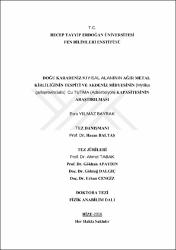| dc.description.abstract | Bu çalışmada, Doğu Karadeniz Bölgesi Denizel Ortamının Metal Kirliliğinin Tespiti yapılmış ve Akdeniz midyesi (Mytilus galloprovincialis) türünün bakır (Cu) tutma (adsorbsiyon) kapasiteleri ortaya konmuştur. Doğu Karadeniz Bölgesi'nde Artvin, Rize, Trabzon ve Giresun illerinin kıyıları boyunca 12 istasyondan deniz suyu, sediment ve Akdeniz midyesi örnekleri mevsimsel [yaz (Temmuz), kış (Şubat), sonbahar (Kasım) ve ilkbahar (Mayıs)] olarak toplanmıştır. Örneklerin metal konsantrasyon değerleri EDXRF spektrometresi (Epsilon5, PANalytical, Almelo, the Netherlands) ile belirlenmiştir. Yapılan metal konsantrasyon analizlerinden tüm örneklerde Mn, Fe, Ni, Cu, Zn, As ve Pb element konsantrasyonları belirlenmeye çalışılmıştır. Deniz suyu, midye yumuşak doku ve sediment örneklerinde tespit edilen metal konsantrasyon değerlerinin daha önce yapılmış olan çalışmalardan genel olarak yüksek olduğu bulunmuştur. Diğer yandan, farklı boy midye yumuşak doku örneklerinde metal konsantrasyonları arasında istatistiksel olarak önemli bir fark gözlenmemiştir (p>0,05). Metal tutma kapasitesi deneylerinde Cu'ın sudaki konsantrasyon artışına paralel olarak Akdeniz midyesi (Mytilus galloprovincialis) yumuşak doku örneklerinde de artış tespit edilmiştir. Buna ilaveten, Akdeniz midyesi yumuşak doku örneklerinde ölçülen ağır metal konsantrasyon sonuçlarından tüketime bağlı olarak insan tarafından tahmini günlük metal alım değerleri (TGA) hesaplanmıştır. Tahmin edilen günlük alım değerlerinin JECFA tarafından tavsiye edilen limit değerlerinden düşük olduğu tespit edilmiştir. Elde edilen konsantrasyon değerlerine ve faktör bileşen analizine göre (PCA), araştırılan alanlarda kirliliğin antropojenik yani insan faaliyetlerinden kaynaklandığı söylenebilir. Sonuçlar insan sağlığı açısından bu bölgede midye tüketimi ile ilgili sağlık riski olmadığını göstermiştir. In this study, heavy metal pollution of the sea state of the Eastern Black Sea was determined and copper (Cu) uptake capacities of the Mediterranean mussel (Mytilus galloprovincialis) were presented. Seawater, sediment and mussel samples were collected seasonally (Summer (July), Winter (February), Fall (November) and Spring (May)) from 12 stations located at the seaside of Artvin, Rize, Trabzon and Giresun in the Eastern Black Sea Region. The metal concentrations of the samples were determined by EDXRF spectrometer (Epsilon5, PANalytical, Almelo, the Netherlands). From the results of metal analyzes of all samples it was tried to determine the elemental concentrations of Mn, Fe, Ni, Cu, Zn, As and Pb. Metal concentrations values determined in mussel soft tissue and sediment samples were generally found to be higher than the previous studies. On the other hand, it was observed no statistically significant differences among the heavy metal concentrations at different shell size mussel soft tissues (p> 0.05). At the heavy metal uptake experiments; for the Mediterranean mussel (Mytilus galloprovincialis) the Cu concentration at the soft tissues was increased as parallel with the increasing Cu concentrations in water. In addition, by using the obtained these heavy metal concentration results, the heavy metal intake by the human population was calculated by taking into account daily mussel consumption. The estimated daily intake values for human health were determined to be below the daily intake values recommended by JECFA. According to the obtained concentrations values and factors component analysis (PCA), it can be said that the investigated area is polluted by anthropologic sources as well as the environmental effects. Results indicates that there is no health risk related to the consumption of mussels for humans in marine environments. | en_US |


















